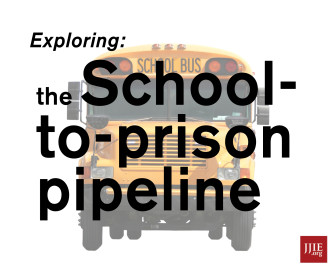 The U.S. Department of Justice says a school-to-prison pipeline that runs through schools, the city police department and juvenile courts threatens children in Meridian, Miss. The school system is negotiating a new set of rules with the DOJ. The city, county, youth court and state of Mississippi, meanwhile, have just gotten hit with a federal lawsuit, and attention that may have already changed their ways.
The U.S. Department of Justice says a school-to-prison pipeline that runs through schools, the city police department and juvenile courts threatens children in Meridian, Miss. The school system is negotiating a new set of rules with the DOJ. The city, county, youth court and state of Mississippi, meanwhile, have just gotten hit with a federal lawsuit, and attention that may have already changed their ways.
“We filed this lawsuit because we have to,” said U.S. Deputy Assistant Attorney General Roy Austin, in a public telephone conference on Oct. 25, the day after his department sued the City of Meridian, Lauderdale County, the county Youth Court judges and Mississippi’s Division of Youth Services claiming that the four agencies work together to ignore children’s due process rights and incarcerate them for minor infractions.
“Children are being incarcerated in the juvenile detention center for days at a time after they are arrested, without a probable cause hearing, by the Youth Court,” said Austin.
 “We found that children have been incarcerated for being suspended from school for things like dress code violations or talking back to teachers,” he continued.
“We found that children have been incarcerated for being suspended from school for things like dress code violations or talking back to teachers,” he continued.
The DOJ charges that the Meridian police arrest kids on the schools’ word, without looking into probable cause that the young person has committed a crime; and that kids are held sometimes for days without any hearing or meaningful legal help. Once the youth hit probation, they are offered contracts that they have no chance of understanding, the DOJ alleges, nor is there a proper probation hearing.
This pipeline disproportionately swallows up black children and children who have disabilities, the DOJ also said. Their findings came at the end of an eight-month investigation.
Austin said they brought the findings to the state and local agencies in August 2012 and invited them to negotiations. “Unfortunately all of the defendants decided that they did not want to do this,” he said.
Learn more about school discipline reform trends at the Juvenile Justice Resource Hub HERE.
Lauderdale County Attorney Richard Barry did not immediately return requests for comment on the lawsuit. Meridian City Attorney Ronnie Walton is out of town. The two, however, released a letter in August claiming the federal investigation was faulty and that, on privacy grounds, they could not cooperate with the federal government’s request for juvenile court records.
But, said Jackson-based Assistant U.S. Attorney Al Jernigan, “shining a light on this problem has done an awful lot to cause some immediate changes … there have been some substantial changes in police practice and the referrals from the school system.”
Indeed, Meridian mother Stephanie Stringfellow, also on the conference call, said she knew of a case that very morning of a child getting a probable cause hearing.
But overall, she worried that “it’s not going to work like everyone’s been saying on the phone.” She pointed out that if children get suspended from school “that gives them time to get in trouble.”
Since suspension is something that happens under the school roof, not via police and courts, it might come to an earlier resolution than the charges about cops and courts.
The new case deals with what happens to youth from the minute police get involved, through the police, court, and any jail time or probation. Schools are not a part of the new lawsuit.
Instead, the Meridian school system is under federal supervision dating from a 1960s desegregation order. In 2010, the DOJ approached the schools about allegations of a phone call to the police every time there was a physical altercation on campus, and of terminating black employees. The DOJ and the school system are in talks about what kind of orderly, predictable discipline rules should apply on campus. Since 2010, a new superintendent has taken over the system and written a new student handbook.
“What has been proposed is very complex and deals with almost any issue you can imagine,” said Jernigan, explaining that the schools have been cooperative. Though nothing final has been yet published, he said he foresees part of the deal will put monitors into the school system.
The new and old cases are like two puzzle pieces that ideally would fit closely together and make a full picture. But, clarified Austin, “one party [the school district] has decided to sit down and talk to us and move this thing forward in a constructive way. The other side has decided they don’t want to cooperate with us.”
It’s not clear how long it will take for the DOJ, Mississippi, Lauderdale, Meridian and the Youth Court to sit at the same table. The defendants must now respond to the federal lawsuit, and depending on how and what both sides argue, the case could take months, if not years.
